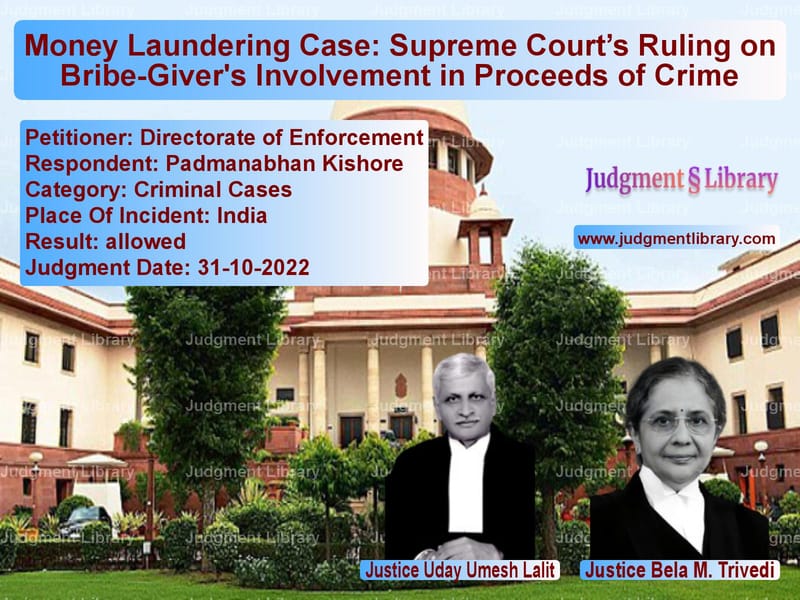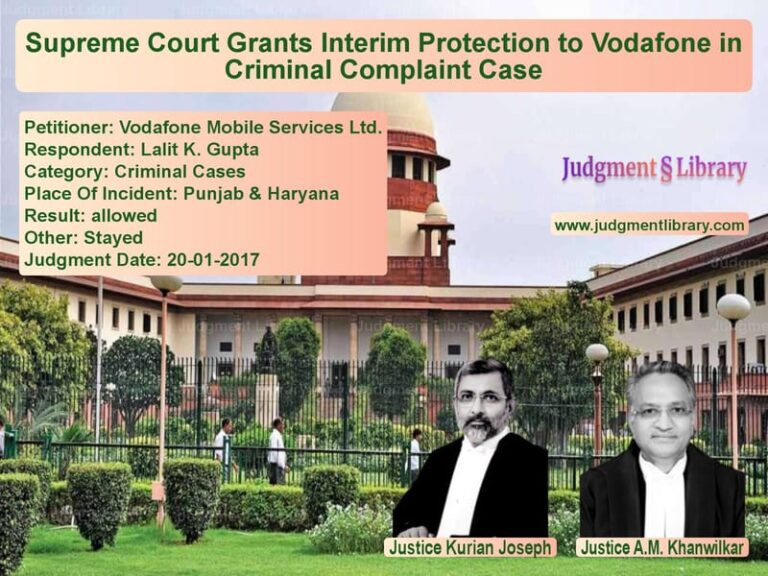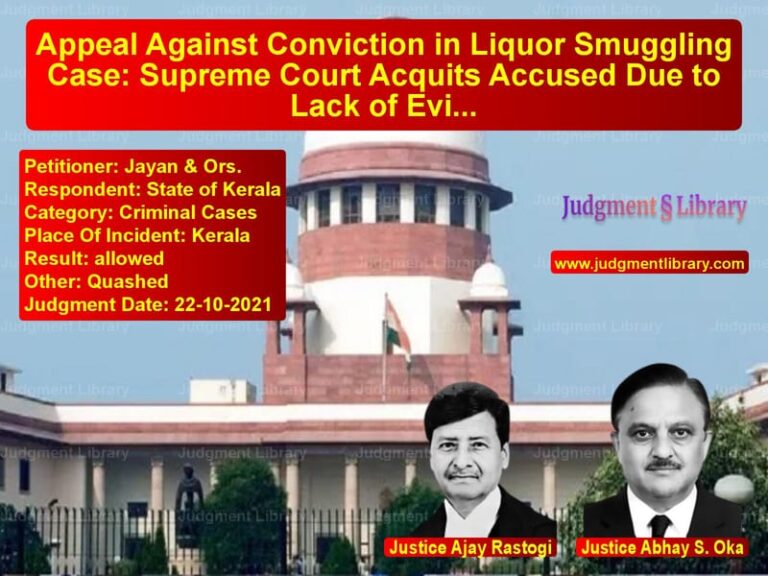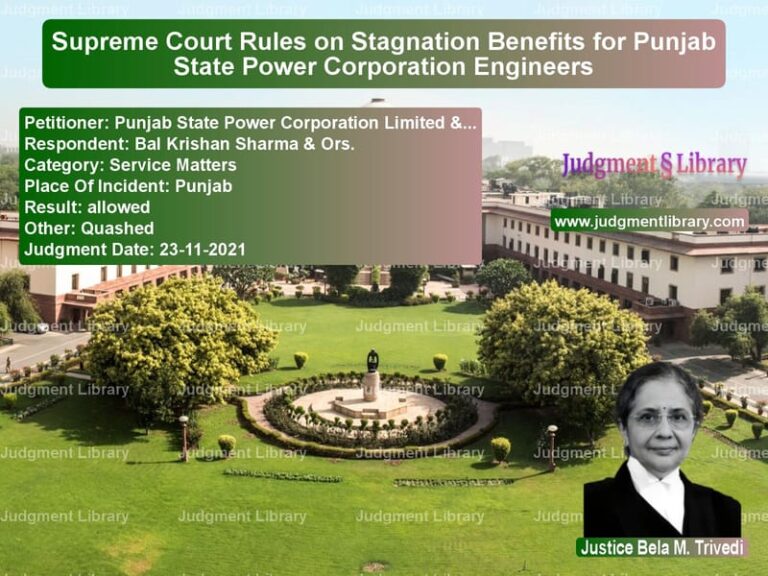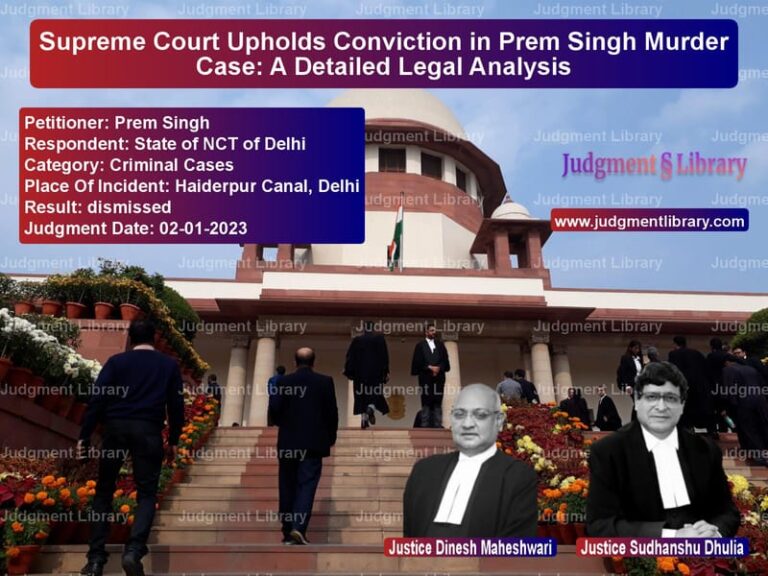Money Laundering Case: Supreme Court’s Ruling on Bribe-Giver’s Involvement in Proceeds of Crime
The Supreme Court of India, in the case of Directorate of Enforcement vs. Padmanabhan Kishore, delivered a significant judgment on the applicability of the Prevention of Money Laundering Act (PMLA) to a person involved in a bribe-giving scenario. The case revolved around Padmanabhan Kishore, the respondent, who was allegedly involved in handing over a bribe to a public servant, Andasu Ravinder, an Additional Commissioner of Income Tax. The key question in this case was whether the respondent’s involvement could be classified under the provisions of the PMLA, which pertains to the laundering of proceeds derived from criminal activities.
The facts leading to the case unfolded in 2011 when a sum of Rs. 50,00,000 was recovered from a car parked in front of the residence of Andasu Ravinder, a public servant. It was alleged that the money was given as a bribe by Padmanabhan Kishore in exchange for favorable actions in his income tax case. The Enforcement Directorate later filed a case under the PMLA, leading to the respondent seeking the quashing of proceedings against him in relation to money laundering.
Background of the Case
The incident took place on August 29, 2011, when a Central Bureau of Investigation (CBI) operation led to the seizure of Rs. 50,00,000 in cash from the car of Andasu Ravinder. The investigation revealed that Padmanabhan Kishore, the respondent, had given the bribe in exchange for favorable treatment regarding his income tax matters. Based on this, the CBI filed a charge sheet against the respondent, alongside other accused individuals, under various provisions of the Prevention of Corruption Act (PCA).
Later, since the crime involved money obtained from a corrupt practice, the Enforcement Directorate registered a case under the PMLA. This led to the filing of a complaint against Padmanabhan Kishore and others under Sections 3 and 4 of the PMLA, which deal with the offence of money laundering. The High Court of Madras, however, quashed the proceedings against the respondent, arguing that he could not be prosecuted under the PMLA for merely handing over the bribe.
Appellant’s Arguments
The Directorate of Enforcement, representing the appellant, contended that:
- The respondent’s actions, specifically handing over the bribe, were integral to the crime, and his role in the bribe-giving process made him a participant in the laundering of proceeds of crime under the PMLA.
- Under Section 3 of the PMLA, a person is guilty of money laundering if they are directly or indirectly involved in activities such as concealment, possession, acquisition, use, or projecting proceeds of crime as untainted property.
- The money handed over by the respondent was considered tainted money as soon as it was accepted by the public servant, and the respondent’s involvement in the transaction made him an accomplice in the crime.
Respondent’s Arguments
Padmanabhan Kishore, represented by his counsel, argued the following:
- The money he handed over was not tainted when it was in his possession. It only became tainted when it was received by the public servant, Andasu Ravinder, who accepted the bribe.
- The respondent had no direct involvement in the later stages of the bribe, such as the concealment or use of the money by the public servant.
- As the money did not originate from a criminal activity by the respondent, he should not be prosecuted under the PMLA.
Supreme Court’s Observations
The Supreme Court, after hearing both sides, made the following observations:
- The definition of “proceeds of crime” in the PMLA includes property derived directly or indirectly from criminal activities, such as bribery. The money given by the respondent, which was a bribe, was part of the proceeds of crime once it was accepted by the public servant.
- Section 3 of the PMLA applies to anyone who is involved in activities related to the proceeds of crime, including its concealment, possession, or acquisition. Even if the respondent did not directly benefit from the crime, his involvement in the transaction that led to the creation of tainted money placed him within the scope of the PMLA.
- While it is true that the money only assumed the status of “tainted” when received by the public servant, the respondent’s role in transferring the money was significant. The Court emphasized that his participation in the bribe-giving act was an integral part of the laundering process.
Final Verdict
The Supreme Court held that:
- The High Court had erred in quashing the proceedings under the PMLA, as the respondent’s actions were directly related to the proceeds of a criminal activity.
- The Court reaffirmed that the PMLA’s provisions are broad enough to cover anyone involved in activities connected to proceeds of crime, including those who assist in its transfer.
- The judgment made it clear that the respondent’s involvement in the bribery process was sufficient to bring him under the purview of money laundering laws.
- The appeal was allowed, and the respondent would continue to face prosecution under the PMLA in relation to the bribe and subsequent money laundering activities.
Implications of the Judgment
This ruling holds significant implications for the enforcement of the Prevention of Money Laundering Act, particularly in cases where individuals are involved in facilitating criminal activities, even if they do not directly benefit from the crime:
- The Court emphasized that the definition of “proceeds of crime” under the PMLA is broad and can include money that is involved in the process of bribery, even before it is laundered.
- The judgment clarifies the extent of involvement required for a person to be prosecuted under the PMLA, ensuring that anyone facilitating criminal activities, even indirectly, can be held accountable for money laundering.
- This ruling may have broader implications for future cases involving corruption and money laundering, particularly where multiple parties are involved in facilitating criminal activity.
The Supreme Court’s decision is an important step in ensuring that money laundering laws are applied to all individuals who participate in or assist with criminal activities, even if they do not directly benefit from the crime.
Petitioner Name: Directorate of Enforcement.Respondent Name: Padmanabhan Kishore.Judgment By: Justice Uday Umesh Lalit, Justice Bela M. Trivedi.Place Of Incident: India.Judgment Date: 31-10-2022.
Don’t miss out on the full details! Download the complete judgment in PDF format below and gain valuable insights instantly!
Download Judgment: directorate-of-enfor-vs-padmanabhan-kishore-supreme-court-of-india-judgment-dated-31-10-2022.pdf
Directly Download Judgment: Directly download this Judgment
See all petitions in Money Laundering Cases
See all petitions in Fraud and Forgery
See all petitions in Cyber Crimes
See all petitions in Judgment by Uday Umesh Lalit
See all petitions in Judgment by Bela M. Trivedi
See all petitions in allowed
See all petitions in supreme court of India judgments October 2022
See all petitions in 2022 judgments
See all posts in Criminal Cases Category
See all allowed petitions in Criminal Cases Category
See all Dismissed petitions in Criminal Cases Category
See all partially allowed petitions in Criminal Cases Category

